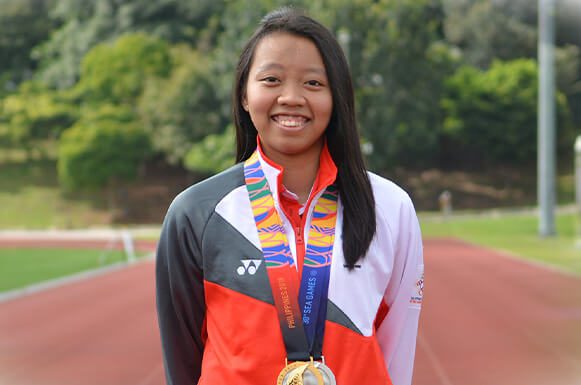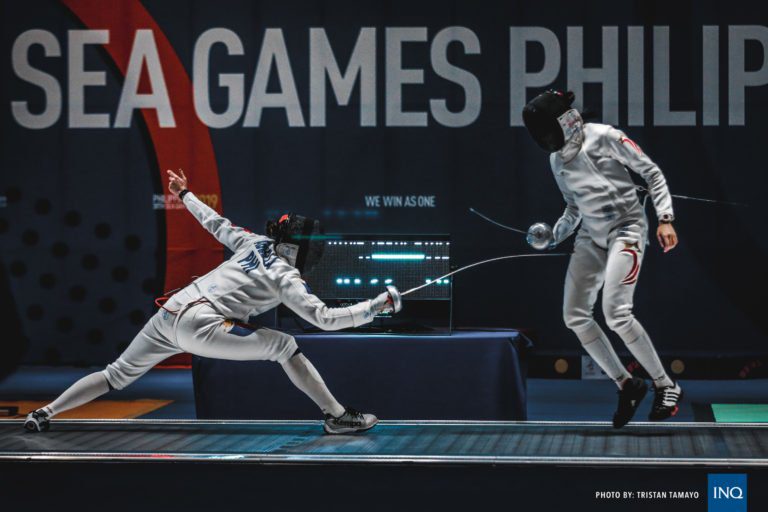Hear from national fencer Kiria Tikanah about competing in Tokyo Olympics, the journey that got her there and why it is important to give back to local sports.
When 8-year-old Kiria first stumbled upon a fencing club at United Square, who knew that she would become the second female fencer in Singapore to qualify for the Olympics.
At the time, Kiria took up fencing because it “can be really fun for a kid”. “You get to ‘stab’ and ‘poke’ other people,” Kiria recounted.
Growing up, Kiria was always a sporty child. When she was 14, she made the national team after participating in various local and overseas competitions. In 2019, she participated in her first SEA games where she attained an individual gold medal and team silver medal.

Throughout her fencing career, Kiria, who is a Chemistry undergraduate at the National University of Singapore (NUS), has gotten used to juggling her studies at the same time.“Through the years, I have learned what good looks like to me, whether it is about fencing or my grades. This has allowed me to manage expectations and achieve sensible goals for myself.”
Journey to the Olympics
“The Olympics has always been my dream. Yet as a sporty child watching the Olympics on TV, it used to seem like an impossible dream,” Kiria confessed. Kiria further explains that most fencers are bigger and stronger, so she had to learn to overcome those challenges by being “smarter”. She develops her technique by choosing better options and the right strategies for her stature and skill set.

The Covid-19 pandemic forced the Tokyo Olympics to be postponed by a year to 2021 but Kiria actually found this to be a silver lining. “More time is definitely a good thing!”
During circuit breaker last year, face-to-face training was disrupted. So her club conducted individual training remotely, such as circuit training to build their stamina. Because fencing is as much a mental sport as it is a physical and technical one, Kiria also focused on strengthening her mental ability. For instance, she went through training sessions about how to mentally deal with different scenarios such as how to cope in the event that she trails behind her competitor.
Going into the qualifiers, Kiria had to beat 5 other higher ranked opponents to qualify for the Olympics – which she did. “As an underdog, I am not expected to win so there is less stress for me,” Kiria reasoned.
How does she feel now? “There was a lot of excitement after I qualified, but as we get closer to the Olympics, a lot more anxiety has started to creep in.” Still, as it is Kiria’s debut, she would like to have an open mind and a positive outlook as she enters the competition. Being the lowest-seeded, which is the lowest rank in the competition, Kiria acknowledges that there is “nothing to lose”. Should she win any match, it would be considered a bonus!
The 20-year-old expects to compete in another two to three Olympics.
Dreaming For Sports In Singapore
Often, we cheer our national athletes during high-profile games such as the Olympics, but forget how much support is needed to raise a national champion.
Funds to national sports organisations such as Fencing Singapore are critically needed to maintain and upgrade training facilities, as well as sponsor fencers who are competing overseas.
Competing overseas is important to develop the athletes, allowing them to be exposed to contesting different styles. Kiria adds that she is inspired by how fencing is a popular sport in other countries such as Korea, China, France and Italy. It is not treated as a niche sport, but a sport that can be enjoyed by all.
Contrary to common perception, fencing is not an expensive sport. Although it requires a lot of equipment, they are extremely long-lasting.
Kiria also encourages others to look beyond the external glory commonly associated with sports. In truth, she finds that you achieve a lot more internally; and the beauty of any sport is that it encapsulates self-improvement. “Even if I do not end up ever becoming a world champion, I believe it is good enough as long as I do my best,” Kiria commented.
In Singapore, we traditionally consider self-improvement to be attaining the best grades. Kiria suggests that sports can offer a refreshing outlook on how to better oneself.
It also provides an alternative pathway in our academically-driven society, where becoming an athlete, sports coach or sports psychologist is a possible career choice.
Moreover, there is a lot we can learn from good sportsmanship. When we see our national athletes win, we learn how discipline, hard work, tenacity and teamwork are key ingredients to success. They serve as role models in society.
When playing sports, we also have the chance to build our character, encouraging us to be our best selves and give our best to others.
While you support local athletes during the Tokyo Olympics, find out how you can support sports in Singapore: https://giving.sg/sports




















